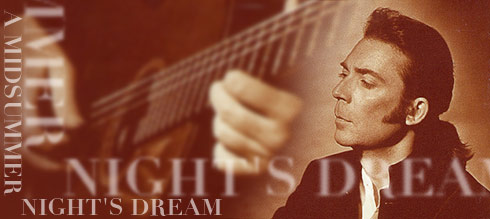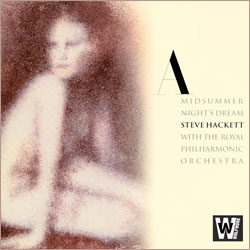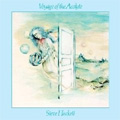


It was in 1595/96 that William Shakespeare wrote A Midsummer Night's Dream, probably to celebrate a marriage in the nobility. 400 years laters it is none other than Steve Hackett who provides an acoustic picture book, as it were, for this work. Hackett is by no means the first artist who let himself be inspired by Shakespeare's drama; of the multitude we shall only mention Carl Orff and Woody Allen. The latter filmed A Midsummer Night's Sex Comedy in 1982 while the former wrote no less than six compositions based on the drama between 1917 and 1967.
It is very helpful to know Shakespeare's play in order to really appreciate Hackett's new album. The drama takes places during the course of four days in two worlds, the world of day and the world of night which is also the world of the forest. The background story in the day world focuses on prince Theseus and his betrothed Hippolyta. Society at the Athenian court of rationalist Theseus is strictly ordered, it has clear laws and a fixed social hierarchy. The world of night or the forest is much more complex and irrational. This is the world the four lovers (Lysander, Demetrius, Hermia, Helena) live in, where the mechanicals (e.g. Nick Bottom, the weaver) attempt to rehearse a play and where the elves and invisible spirits of the fields, forests and meadows live (Oberon, Titania, Puck, Peaseblossom, Cobweb, Moth, Mustardseed and others).
 While Genesis Revisited left listeners in two minds one can be quite certain to read more consistently positive reviews for A Midsummer Night's Dream. Says Hackett: „The most demanding music I have written for guitar and orchestra". A German encyclopedia describes Shakespeare's play as a combination of magic, wit, irony and romance. Better words than these could not be found for Hackett's finde musical rendition. He captures the mood of a midsummer night in the 15th century with its folklore, superstitions, magic and exuberance. The guitar as the main instrument is supported by an orchestra directed by Hackett's cousin Matt Dunkley. The music was arranged by Steve Hackett and Roger King, who also co-wrote In The Beached Margent Of The Sea and plays the organ on Celebration. Steve's brother John can also be heard playing the flute in places. The cover art, Titania Awakes, is, as usual, by Kim Poor.
While Genesis Revisited left listeners in two minds one can be quite certain to read more consistently positive reviews for A Midsummer Night's Dream. Says Hackett: „The most demanding music I have written for guitar and orchestra". A German encyclopedia describes Shakespeare's play as a combination of magic, wit, irony and romance. Better words than these could not be found for Hackett's finde musical rendition. He captures the mood of a midsummer night in the 15th century with its folklore, superstitions, magic and exuberance. The guitar as the main instrument is supported by an orchestra directed by Hackett's cousin Matt Dunkley. The music was arranged by Steve Hackett and Roger King, who also co-wrote In The Beached Margent Of The Sea and plays the organ on Celebration. Steve's brother John can also be heard playing the flute in places. The cover art, Titania Awakes, is, as usual, by Kim Poor.
• The Palace Of Theseus
The opening scene is set in the palace of Theseus which receives a majestical description at the hands of Hackett and the orchestra..
• A Form In Wax
(Midsummer Night's Dream = MSN 1.1.49)Hermia is in love with Lysander, but Hermia's father Egeus has picked Demetrius for Hermia. He seeks support for his meddling with Hermia's life in the old laws of Athens and from Theseus. Theseus declared Egeus is free to do with his daughter what he wants as she is just „a form in wax“. Egeus, in a godlike position, can shape this form or melt it down. After the elegiac orchestral introduction and gentle continuation of the theme on the guitar A Form In Wax grows to a magnificent, hectic climax before it ends in the elegiac vein. The wistfulness in the beginning and at the end may describe Hermia's feelings, while the hectic middle expresses her rebellion against the established rules and conventions that limit her freedom and are expressed in Theseus' merciless judgement.
• By Paved Fountain
We are in the forest witnessing a marital dispute between the elf kind Oberon and his queen Titania. They each accuse the other of having had an affair with Theseus and Hippolyta, respectively. The gentle-sad guitar piece is one Hackett aficionados will know as Beja Flor from the Live CD There Are Many Sides To The Night. Hackett used the tremolo finger technique before, e.g. on Black Light, When The Bell Breaks or Pierrot.
• Titania
Hackett dedicates a guitar piece to the elf queen which does not quite convey the positive character Shakespeare gave her.
• Set Your Heart At Rest
(MSN 2.1.122)Oberon is hot for Titania's „Indian boy“, a child she took in charge when his mother died. Oberon wants the boy as a varlet, but Titania is emphatic: „Set your heart at rest!“ Slow, lamenting guitar sounds seem to describe the feelings of „foster mom“ Titania. The piece ends with a brief orchestral passage.
Lively guitar sounds illustrate Oberon. It is an apt description of the elf queen whose good character comes through in every plan he concocts with his lieutenant, Puck. The only negative thing in him is his desire for Titania's Indian boy.
• Within This Wood
(MSN 2.1.138 and 2.1.192)Within This Wood is a brittle musical illustration of the second main location of the plot, complete with cuckoo calls imitated on Hackett's guitar.
• In The Beached Margent Of The Sea
This orchestral piece penned by Hackett and King sounds as if it was part of a film score. It gives the listener an appetite for more of their collaborations. Another duo, Anthony Phillips and Harry Williamson (Tarka), comes to mind.
• Between The Cold Moon & The Earth
(MSN 2.1.156)Oberon tells his lieutenant Puck that he saw Amor flying through the cold between moon and earth. One of his arrows of love, he reports, missed the aim and hit a small flower. Since then, wondrous things happen to those who have the sap of that flower dripped into their eyes: They fall in love with the first being they notice upon awaking. Puck is charged with finding this flower, for Oberon has made a plan for Titania's Indian boy and other ideas of putting the love juice to good use. Romantic music for guitar and orchestra may illustrate the flight of Amor.
• Puck
Puck sounds familiar for two reasons. One, it begins with harmonic like Horizons, and two, it could be heard as Bacchus on There Are Many Sides To The Night and as Baroque at previous Hackett shows. Puck is a being of many epithets, a household name of English folklore who specializes in playing practical jokes around the house. Hackett describes him very well with a lively, secretive guitar piece.
• Helena
Hackett uses mainly solo guitar to illustrate the sensitive nature of Helen who pines for love and is subjected to all kinds of love confusion.
• Peaseblossom, Cobweb, Moth & Mustardseed
After Oberon has dripped the flower juice into Titania's eyes (MSN 3.1.150) she awakes and sees Bottom the weaver who has been given an ass's head by Puck. Titania gives Bottom the elves Peaseblossom, Cobweb, Moth and Mustardseed as servants (all of these herbs were used for healing purposes). The piece begins with a flute bit by John Hackett, brother Steve comes in with hectic virtuosity that moves on to sundry effects on the acoustic guitar complete with a Colony Of Slippermen cameo. After more samples of onomatopoeic guitar art there is a brief, rhythmic quotation from Clocks before the song turns virtuoso melodic. The song, divided in four parts, sounds like its title: quaintly bizarre.
• Mountains Turned Into Clouds
(MSN 4.1.187)In the fourth act of Shakespeare's play the nightly events come to an end. Oberon has got the Indian boy and releases Titania from her passion for Bottom the weaver. Theseus and his entourage go on a hunt in the forest where they find the four lovers asleep. Theseus discovers his heart (because of the peaceful image?) and announces there will be, despite complaints by Hermia's father, a triple wedding. Demetrius is astonished at Theseus' chance of hearts, and sums up the events of the night that seem to lose importance though they will, of course, influence the invidiuals' lives: „These things seem small and undistinguishable / Like far-off mountains turned into clouds“. What feeble crutches words are to describe music with shows in this orchestral piece. Our suggestion: Just listen to the brilliant piece!
• The Lunatic, The Lover & The Poet
(MSN 5.1.7)Theseus still does not believe in the truths of the lunatics, the poet and the lovers. Unlike his wife he finds it hard to deal with the irrational, the fairy magic. Theseus dismisses the imagination of the three as jugglery and does not realise that there is reason to the peculiar. After the orchestral beginning with the flute Hackett dedicates a guitar piece in 3/4 to the three.
• Starlight
Deep, mystical flute sounds lead into a dreamlike, romantic, relaxed and relaxing piece of music with a very catchy theme. If music like this only had a remote chance at making it into any chars Starlight ought to be released as a single.
• Lysander And Demetrius
After flute and orchestra for and intro Hackett plays a varied guitar piece that nicely illustrates the characters and conflicts of the two youths who found their luck after many problems.
• Celebration
The strict laws have been lifted, the four lovers have reached their goals and a new order comes in. This is a reason to celebrate for them and for Hackett and his musical band who give everything in Celebration (e.g. Roger King, whose playing of the church organ of St Simon Zelotes, Chelsea, is a real treat). Various themes of A Midsummer Night's Dream are reprised. This mixture of fanfare, hymn and overture is the actual finale of a remarkable album.
• All Is Mended
(MSN 5.1.411)In Shakespeare's play it is Puck who addresses the audience at the very end. Steve Hackett takes his leave with a brief musical epilogue that, as End Of Day, already marked the end of the live album There Are Many Sides To The Night.




Steves first Soloalbum from 1975, with Phil Collins and Mike Rutherford. Remaster Version from 2005 with Bonustracks.
Review available